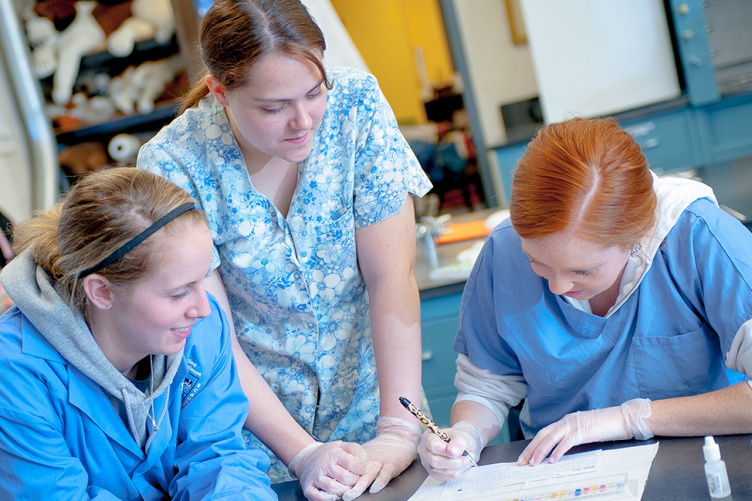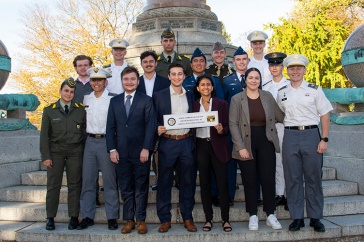
The U.S. Bureau of Labor Statistics expects veterinary technician jobs to increase 19 percent between 2014 and 2024, making the career among the fastest growing occupations in the country.
But it’s passion not statistics that drives four students from the veterinary technology program at UNH’s Thompson School of Applied Science, who got together recently to talk about their experience.
Just ask Brittany Guay ’18, who, even after earning two associate’s degrees, was still looking to light a fire in her belly. It was some soul searching and a question — what would she be willing to do for free? — that led her to the Thompson School’s vet tech program and a feeling, finally, that she’d found her calling.
“I love taking care of animals,” she says. “And I love the vet tech field because you get a lot of one-on-one with the animal. When it comes down to it, I want to be the person who looks animals in their eyes and says ‘I’m going to make you feel better.’”
For Amber Ganley ’18, no soul searching was needed. Ganley, who grew up in Florida near a rehabilitation center for loggerhead sea turtles, knew she wanted a career in veterinary medicine even when she was a child.
“It was a small little shack with a couple tanks of little turtles in it — they’d come in from the ocean after being hit by a boat or something,” she says of the center that inspired her. “I thought that would be the coolest job ever, to be helping rehabilitate the turtles and then sending them back out.”
“To be able to do hands-on work here is so important in preparing you for the workplace.”
Ganley plans to enroll in a four-year pre-vet program following graduation.
“I want to become a vet tech to understand the whole gamut of animal care,” she says. “When you become a veterinarian, you need to be able to appreciate the people working for you and the work they do.”
Elizabeth Miller ’18, who started working in a veterinary clinic when she was still enrolled in an agricultural high school, agrees. She, too, plans to become a veterinarian, and sees her veterinary technician degree as a strong foundation for her future studies.
A hands-on learner with a serious interest in emergency medicine, Ashley Williams ’18, came to the vet tech program from a different path altogether.
“I started as a four-year animal science major, but after a year I switched to the Thompson School’s two- year program,” she says. “I found the vet tech program was definitely more compatible with my learning style.”
Active, experiential learning is a defining characteristic of the program, whether in the state-of-the art teaching laboratories, the Thompson School Grooming Shop, the student-run PAWS wellness clinics in Dover and Somersworth, New Hampshire, or with horses at UNH’s equine facility or its working dairy herd.
“Especially in this field, if you’re not trying it and practicing it, you’re not going to know what to do,” says Miller. “To be able to do hands-on work here is so important in preparing you for the workplace.”
This fall, the American Veterinary Medical Association-accredited program will add yet another active-learning asset that will serve both students and the surrounding community: an on-campus veterinary clinic.
The new clinic will offer wellness care and diagnostic services to low-income pet owners, with plans to add surgical and dental services. Donated flea and tick products and heartworm medication will also be available at no cost.
“The new clinic is fully equipped and state-of-the art,” says Dr. Sarah Proctor, director of the veterinary technology program and clinical assistant professor. “It will give students a real clinical experience while still under the guidance of our faculty. We’ve been providing wellness care to low-income pets through our PAWS clinic. Now we’ll be able to treat sick pets, too.”
While Ganley, Guay, Miller and Williams are excited about heading into their second year and looking forward to the clinic’s opening, they’ll be the first to say that the work isn’t for everyone. So what advice do they have for someone considering a career as a veterinary technician? First, get experience working at an animal hospital to develop an understanding of the mental, emotional and physical demands of the job. Second, prepare to buckle down and work.
“This program is very intensive,” says Guay. “But it pays off.”
Visit the Thompson School of Applied Science at UNH.
-
Written By:
Sarah Schaier | College of Life Sciences and Agriculture




















































